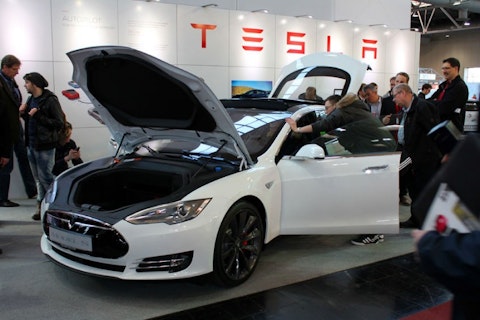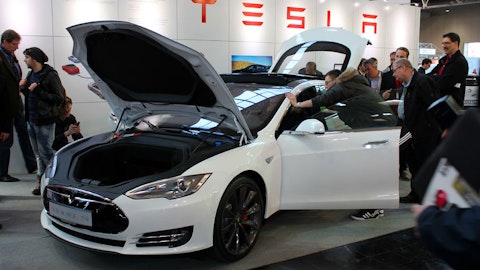Tesla Inc (NASDAQ:TSLA) is probably one of the most controversial stocks on the market today. On the one hand, many people are genuinely excited about the company, its products and its (let’s face it) brilliant CEO, who apparently stops at nothing to do what he wants. On the other hand, the stock’s strong performance and skyrocketing valuation has created a lot of skeptics, many of whom have shorted the stock (currently over 38% of the float is short).
Among the investors shorting the stock is Jim Chanos of Kynikos, who said that Tesla’s problem is its scale and that it will struggle to increase its scale in order to become a fully-grown car manufacturer alongside General Motors Company (NYSE:GM), Ford Motor Company (NYSE:F), Fiat Chrysler Automobiles NV (NYSE:FCAU), etc. Vilas Capital’s John Thompson has been another long-time critic of Tesla Inc (NASDAQ:TSLA), having called it an “over-hyped, lousy company” and a company that is “destined to go bankrupt”. In a recent letter to investors, billionaire David Einhorn‘s Greenlight Capital also outlined its short bet on Tesla (which has lost it a lot of money this year, as the stock gained over 30% in Q1) saying that the company is unlikely to produce its next Model 3 vehicle in high-enough volume and at sufficient margins to justify its current valuation.
Then there’s Mark Spiegel of Stanphyl Capital. Judging by his Twitter feed, Spiegel either has a very big bet against Tesla, or has some personal vendetta against Elon Musk, because he really wants to see him and Tesla Inc (NASDAQ:TSLA) fail. Last year, Spiegel spoke at the Robin Hood Investors Conference and outlined why he things that Tesla’s valuation is zero (he actually says it’s less than zero including the debt) in a 152-slide presentation. Basically, he thinks that Tesla will have a rough future as it will face more competition in the EV-space from larger car makers and that Elon Musk should not be trusted, because he is making misleading statements.

Copyright: wolandmaster / 123RF Stock Photo
Is Spiegel right? There is some truth in his ideas about Tesla Inc (NASDAQ:TSLA). The stock is indeed overvalued, as also expressed by other big fund managers and a lot of this overvaluation has more to do with the hype around the company, its innovation, and Elon Musk’s genius. At some point the hype will dial down and the stock will fall, probably by a lot (analysts currently mostly rate the stock as a ‘Hold’ with an average price target of around $271). Plus, Spiegel seems to be a great investor, with Business Insider saying Stanphyl’s gains amounted to 34.7% in the first 11 months of 2016. On the other hand, it’s the opinion of a guy who’s clearly trying too hard, and who clearly has an interest in seeing the stock go down. And the market, for its part, seems to not give a crap about short-sellers’ opinions, as Tesla’s stock is 44% in the green so far this year (probably a lot of that has to do with “animal spirits”, though).
So, on the one hand we have the analysis conducted by short-sellers like Spiegel and the opinions presented by Einhorn, Chanos, and Thompson. On the other hand, we have Tesla Inc (NASDAQ:TSLA) bulls like Ron Baron, who expects to quadruple his investment in Tesla by 2020 and Social Capital LP’s Chamath Palihapitiya, who at the Ira Sohn Investment Conference earlier today, compared Tesla’s performance to Apple Inc. (NASDAQ:AAPL), but said that he hasn’t bought shares of the company, opting instead for convertible bonds. This provides him downside protection and also gives him “a chance to stand shoulder to shoulder with the guy [they] think is our generation’s Thomas Edison.”
Follow Tesla Inc. (NASDAQ:TSLA)
Follow Tesla Inc. (NASDAQ:TSLA)
Receive real-time insider trading and news alerts
Here are some things that short-sellers might get wrong or underestimate. Spiegel believes that Tesla will struggle even more with its financials, since it currently has no competition in the EV space, but with more companies having announced their own fully-electric vehicles, the competition will intensify. This is not entirely true, because like it or not, Tesla Inc (NASDAQ:TSLA) has been competing with traditional internal combustion engine vehicles, even though traditional car makers weren’t bothered by Tesla due to its small production volume. However, Tesla managed to score a lot of points on the innovation side and with its attention to detail. We should remember here that the release of the Model X was delayed because Elon Musk wanted gulf wing rear doors and he wanted them to open in a specific way. Maybe it wasn’t a good thing for the company’s financials, but this attention and the desire to make every little thing work is what will help Tesla win customers’ votes in the long run.
In this way, as Tesla Inc (NASDAQ:TSLA) has already been competing in the automotive market, it’s unlikely that a couple of new electric vehicles will change much. Moreover, if we look closer, it doesn’t look like big car companies are actually interested in electric vehicles. Volkswagen only started to make a lot of fuss about its commitment to electric vehicles after the diesel scandal emerged. According to Sierra Club, Ford Motor Company (NYSE:F) advertised its gasoline-powered Focus on cable and broadcast TV around 4,750 times, while its Focus Electric was advertised only about 200 times on national TV. Mercedes-Benz didn’t even bother to advertise its electric B-class to national TV audiences, compared to 1,400 instances of advertisement of its Mercedes C-class.
Yes, big car makers can invest much more money in research for electric vehicles and can subsidize them from sales of their traditional ICE units, but they don’t really seem to believe in electric vehicles. Or, rather, they might not be interested in the EV market evolving. Why? Because there is a whole infrastructure built around ICE vehicles and many companies make more money from services than from selling the actual car. An EV doesn’t need an oil change, doesn’t require air and fuel filter replacements, belt replacements, spark plugs, clutch, shift linkages and many many other moving parts that at some point break down in a traditional gasoline car and require replacement.
For years, car companies have even been trying to make it illegal for you to repair your own car, pushing you towards dealership-owned repair shops. As cars became more computerized, companies even attempted to invoke copyright laws to prevent people from tinkering with the on-board computers, which basically suggested that people didn’t actually own their cars. To try and make its argument more convincing, Deere & Company (NYSE:DE) last year said that if people are allowed to modify car computer systems, they could use them to download pirated music (because what’s better than a mixed CD for your girlfriend? A mixed CD for your girlfriend downloaded using your tractor).
Car companies are also not interested in electric vehicles because they don’t have the required infrastructure to support long trips. Tesla Inc (NASDAQ:TSLA) has a wide network of superchargers, which is one of the pillars of its success. Other car makers will have to figure something out in this area, although they might pull it off with smaller EVs designed for city-use only, where owners can park their cars and charge them overnight.
Another argument, why big car makers don’t really care about Electric Vehicles is that they asked the EPA (led by climate change denier Scott Pruitt) to withdraw a decision made by the Obama administration to lock in vehicle emission rules through 2025. The Alliance of Automobile Manufacturers, which includes General Motors Company (NYSE:GM), Toyota, Volkswagen, Mercedes, Fiat Chrysler Automobiles NV (NYSE:FCAU), Ford Motor Company (NYSE:F), and several other manufacturers, said that the standard to achieve 54.5 miles per gallon by 2025 is too high and will result in higher costs and higher price tags for vehicles. So, if car makers were so committed to making electric vehicles, why would they feel threatened by higher fuel efficiency standards?
And let’s not forget the fact that Tesla Inc (NASDAQ:TSLA) has disrupted the car market and it’s not only selling a car, but a lifestyle. In this case, Tesla can indeed be compared to Apple Inc. (NASDAQ:AAPL). A couple of years ago, there were many discussions that Apple might struggle because its competitors had caught up and that the company’s sales would slump, since many companies (like Xiaomi, Huawei, etc.) have started to make really good smartphones with quality and specifications up to par with iPhones. Yet, Apple is doing pretty good. Granted, the circumstances are different, since Apple Inc. (NASDAQ:AAPL) has way more money than its competitors. However, if Tesla will be able to start mass producing its vehicles, continue to build its infrastructure and enter in the shared car market before other competitors, it’s likely to succeed. There might be many “ifs”, but like all Tesla bulls I believe that Elon Musk is the guy to pull it off.
In conclusion, Tesla bulls will likely be disappointed in the medium-run, as they are overestimating the company and ignoring some issues that might come along the way. In the long run, they will score big, as Tesla Inc (NASDAQ:TSLA) not only will become a leading EV maker, but will also become one of the biggest residential solar panel (solar roof) companies. On the other hand, Tesla bears will also be disappointed, especially the big skeptics that want to see the company fail. They will make some profits along the way from their short bets, but they will close their positions at the first opportunity and then will say that they decided to cover the shorts, even though they still believe that the company is doomed and all bulls are still idiots. Of course, there’s no guarantee that either scenario will happen.
Disclosure: None





